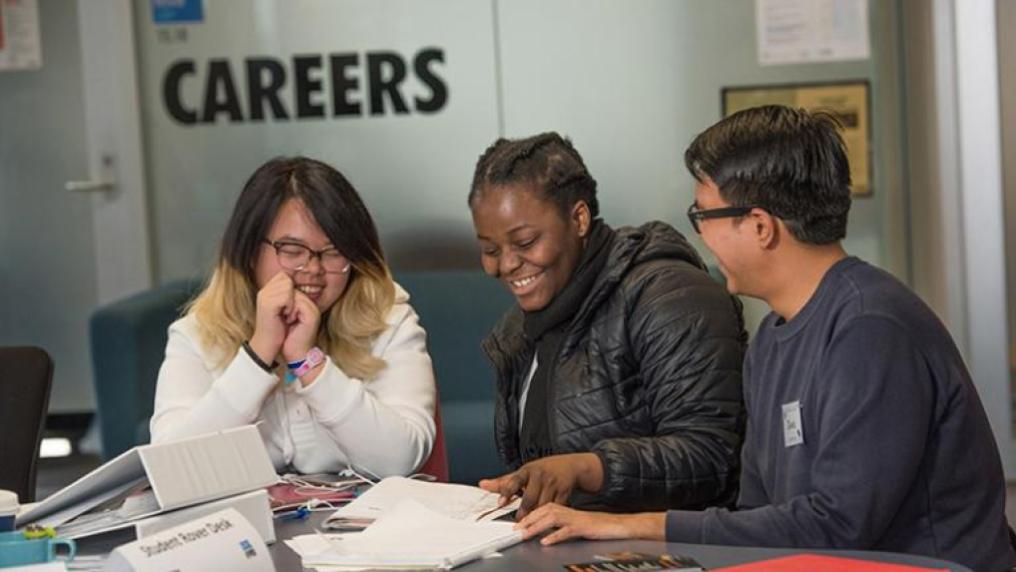10 soft skills that boost your employability
What are soft skills and why are they important?
Getting a degree is a great first step to getting your dream job. While a big part of uni is about developing specific skills, knowledge and confidence you need to succeed in your new career, employers also look beyond academic ability.
That's why it's crucial to develop soft skills like teamwork, communication and critical thinking. When applying for jobs, employers value soft skills because it shows you can adapt to new situations and changes over the course of your role and career.
Developing these employability skills shows you’ll be ready to tackle whatever comes next in your journey.

1. Communication
Being able to communicate clearly will help you every day, both at work and in your everyday life. A good communicator adjusts how they speak or write depending on the person and situation. Different scenarios call for different approaches, whether you’re communicating with a coworker, client, your mum, a romantic partner or your dog.
Employers look for people who communicate concisely, while knowing how to balance a professional tone with approachability and warmth.
How to develop communication skills
Practice makes perfect. Get comfortable talking to all kinds of people in different situations, from your barista to your classmates. Take note of how people communicate with you in different scenarios and notice how we mirror one another’s style to put each other at ease.
Examples in life that showcase communication skills
Collaborating with other students at school to complete a group project, playing a team sport, streaming or creating online content.
2. Creativity and innovation
Thinking differently helps uncover unique solutions. That’s why so many employers value creativity and innovative thinking. Tackling things from new angles, taking calculated risks and thinking outside the box helps us find valuable new ways of doing things.
How to develop creativity and innovation
Be open to different ideas, whether in the books you read, the podcasts you listen to or the content, shows and movies you watch. New experiences, like travelling, taking on new hobbies or chatting to new people, can also help open your mind and find new sources of inspiration.
Examples in life that showcase creativity and innovation
Writing a song, telling a story, making up rules to a game, figuring out a new way of doing things at a job.
3. Initiative
Being willing to make decisions and take charge shows you’re responsible and can get things done. Having initiative means you’re motivated and ready to work. It means you’ll take on new challenges without constant, specific direction.
How to develop initiative
Nurture your sense of self-direction by making plans about what you want to achieve and following them. This could be as simple as planning your daily schedule or an itinerary on a holiday or weekend trip. Make a habit of trusting and believing in yourself, which is another important ingredient for developing initiative.
Examples in life that showcase initiative
Learning a new skill, volunteering for an event, offering to help a neighbour, mediating a conflict between friends or family members.
4. Flexibility
Like other parts of life, work can sometimes be unpredictable. Being flexible means you can adjust to new situations or problems that come up. Whether it’s managing clients with different needs or making things work without all the supplies you need, a flexible mindset allows you to approach unexpected situations with calm and control.
How to develop flexibility
Challenge yourself to try new things, whether a type of food or activity. Think about what you’d do if something unexpected happened. How would you manage the situation step-by-step with a level head? Exploring these hypotheticals can help you build more confidence when the next surprise happens.
Examples that showcase flexibility
Embracing and accepting change when trying a new activity, trying a new hobby, changing jobs, moving to a new city, changing schools.
5. Planning and organisation
Organised workers who can plan and complete tasks without supervision are seen as highly valuable to employers. Great planning and organisation skills shows you’re reliable enough to manage your own time, assess your progress, complete tasks and ask for help when you need it.
How to develop your planning and organisation skills
Write down some goals and set yourself realistic deadlines for meeting them. Doing this on a regular basis helps you build up your planning and organisation skills. Remember, it’s not about being perfect: what’s important is knowing what can be done, planning how it’ll happen and then doing it – all according to plan.
Examples that showcase planning and organisation skills
Completing a big school assignment, participating in a competition you had to prepare for, meeting an important deadline at work.
6. Critical thinking
How you assess and interpret information affects your ability to make informed judgements and decisions. Critical thinking is valued by employers because it shows you can recognise assumptions, identify biases and consider different perspectives. This makes you better at solving problems and finding the best course of action.
How to develop critical thinking skills
Like a lot of the employability skills on this list, being open minded and trying new things helps develop critical thinking skills. Practice analysing people's arguments when they offer different opinions on a particular subject. Think about your own ideas, thoughts and feelings on a topic and discuss them with others to explore how we approach things differently.
Examples that showcase critical thinking skills
Writing movie reviews, participating in brainstorming sessions, doing escape rooms.
7. Teamwork
Collaborating and cooperating with others is a must in every workplace. Good teamwork makes it easier to get things done while everyone enjoys a more pleasant, friendly and supportive environment.
How to develop teamwork skills
Get good at teamwork by joining a team. Everything from playing sports to cooking a big meal with your family can help build your teamwork skills. Remember that good teamwork comes from a combination of skills and attributes like active listening, respect, trust, empathy and accountability.
Examples that showcase teamwork
Joining a sports club, completing group assignments at school, playing in a band, volunteering for a community project or event.
8. Cultural competence
In a diverse and interconnected world, employers value workers who help foster inclusivity and respect. Cultural competence is about being respectful of the different cultural norms, values, behaviours and beliefs you’ll come across in work and life.
How to develop cultural competence
Immerse yourself in different cultures by watching movies and documentaries from different cultures, listening to musical genres from around the world, trying new foods and attending cultural events in your local area. Try to connect with people from different backgrounds and culture. Reflect on your own cultural and intersectional* identity and how it might influence your perceptions, values, beliefs and behaviours.
Examples that showcase cultural competence
Knowing some history about another culture, showing interest in cultural practices or beliefs other than your own or being passionate about different cuisines are all ways to show you have an open mind and a positive attitude about other cultures.
*Intersectionality refers to how our identity and experiences are shaped by overlapping and interconnected social categories like race, gender, class, sexuality and disability.
9. Resilience
Setbacks are bound to happen in work and life. Being resilient is all about dusting yourself off and moving forward after dealing with an unexpected problem or negative feedback.
How to develop resilience
Take on difficult tasks that you’ll probably struggle with at first. For example, practicing woodworking, learning a musical instrument, tackling tricky puzzles or even getting through a really hard video game. Make a habit of looking at the positive side of challenging situation – did you learn something new? Get better at a skill? Meditation, mindfulness and exercise can also help you manage the emotional side of dealing with setbacks.
Examples that showcase your resilience
Rewriting an essay halfway through it because you need to change direction, working through a bad interaction with a customer at work, solving a difficult problem after failing multiple times.
10. Digital literacy
Employers expect graduates to have basic digital tech skills, like using email, word processors and spreadsheets. Of course, the level of tech-savviness expected depends on the job and industry. In many cases, it’s more about developing an intuitive understanding of how online tools and platforms work rather than being an expert at specific tools and software.
How to develop digital literacy
If you’re not tech-savvy, experiment with different digital tools and platforms to see how they work. You can also look for short courses or online tutorials to develop some basic skills. An important digital skill to develop for the workplace is online safety: how to recognise scams and protect your personal information.
Examples that showcase your digital literacy
Creating content using social media platforms, running an online store, using search engines, LLMs and other AI tools to find information and solve problems.

Get help at every stage of your career journey
Here at VU, we provide personalised support and online resources throughout your study and career journey.
From creating a job-ready resume to advising you on graduate opportunities, our experienced job coaches and career counsellors are here to guide you down your unique path.